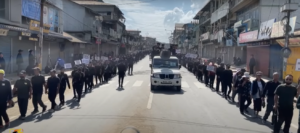Unau is your digital destination for celebrating the essence of brotherhood across the Kuki, Mizo, Zomi, and Hmar tribes.
October 5, 2023: A surge of violence erupted anew in Manipur as Meitei terrorists and militants resumed their military attacks on villages inhabited by the Zo ethnic tribes (Zomi-Kuki-Mizo) following a brief respite. The assault reignited on the evening of October 4, around 10 pm, with fresh bouts of firing and arson reported in the Zo settlement of New Keithelmanbi, situated in the buffer zone between Imphal West and Kanggui (Kangpokpi).
The incident unfolded as armed Meitei men infiltrated the village, initiating a spree of house torchings. The central security forces stationed in the vicinity were alerted and promptly responded to the scene, engaging in a gunfire exchange with the aggressors. The intermittent firing endured until 6 am the following morning, at which point the attackers retreated towards Moidangpok.

While the immediate narrative by Meitei media outlets accused ‘Kuki militants’ of orchestrating the incident, the claim lacked substantiating evidence or logic, given the village’s Zo affiliation. Locals vehemently identified the culprits as armed Meitei militants, particularly pointing towards the Arambai Tenggol group. Suspicion also veered towards the Office-in-Charge of the nearby Patsoi Police Station, who is believed to have a vested interest in instigating such turmoil to justify subsequent combing operations within the Zo settlement.
Adding to the complexity of the situation, the notorious Meira Paibis arrived swiftly at the attack site, obstructing the efforts of the Central forces. This intervention is perceived as a standard tactic employed by Meitei militants to evade the superior Central security forces. A local volunteer voiced the frustration shared by many, characterizing the Meitei militants as “cowardly fighters” who have habitually sought refuge behind the Meira Paibis during their assaults against Central security forces and Zo civilians.
The image of smoke billowing from the torched houses in New Keithelmanbi paints a grim picture of the ongoing tensions and the perilous reality faced by the Zo settlements. The narrative of Meitei militants hiding behind Meira Paibis while launching their attacks underscores the asymmetric nature of this conflict and the challenge posed to the Central forces in restoring peace.
The resumed violence against Zo settlements casts a dark shadow over the region, threatening to further escalate the already tenuous relations among different ethnic communities in Manipur. The reactions from various quarters reflect the deep-seated mistrust and the cycle of blame that continues to perpetuate the violence.
The engagement between Central forces and Meitei attackers signifies a broader struggle for control and stability in the region. It accentuates the dire need for a robust and concerted effort from all stakeholders, including the state and central authorities, to address the root causes of this enduring conflict, deliver justice to the affected communities, and foster a conducive environment for peaceful coexistence.
Moreover, the incident reignites the discourse surrounding the effectiveness of the current security apparatus and the urgency for a transparent investigation into the alleged involvement of local law enforcement in exacerbating the conflict. As the dust settles from the latest bout of violence, the pressing question remains: what measures will be taken to prevent the recurrence of such attacks and to ensure the safety and security of the Zo settlements and other vulnerable communities in Manipur?
The unfolding narrative in Manipur is a stark reminder of the convoluted ethnic dynamics and the precarious security situation that hangs like a Damocles sword over the state. As Manipur grapples with the ghosts of ethnic discord, the path towards lasting peace appears to be a long and arduous one, necessitating a collective will to transcend communal divisions and forge a unified front against violence and terror.







